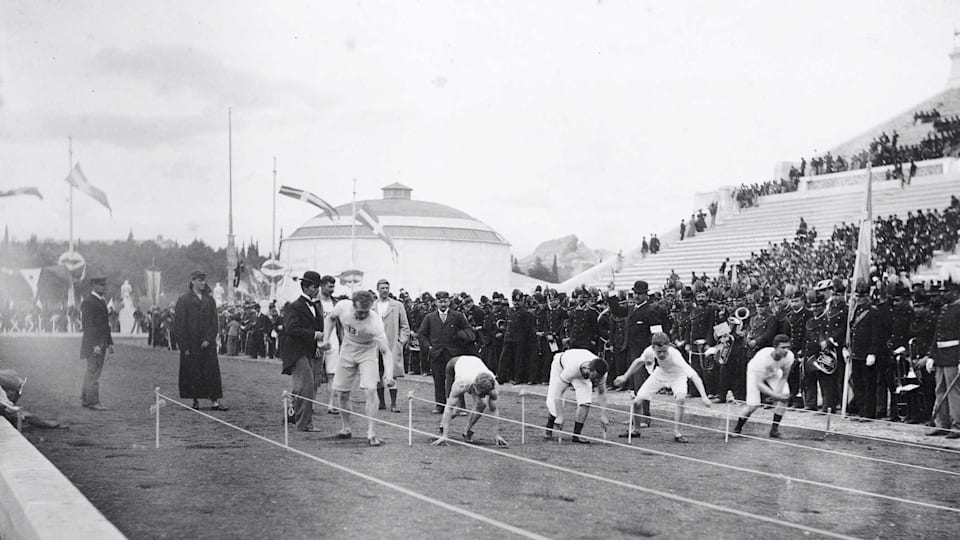6 April 1896: the 100m opens the first Olympic Games of the modern era
Francis Lane and Tom Burke: two pioneers of the great Olympic adventure of the modern era. On 6 April 1896, in Athens, Lane won the first ever event: one of the 100m heats. Burke went on to win the final, paving the way for the future kings of the sprint, right up to Usain Bolt!

The Opening Ceremony for the first Olympic Games of the modern era, which had been founded by Pierre de Coubertin in 1894, took place on 6 April 1896 in the Panathenaic Stadium in the Greek capital, in front of 80,000 spectators. Fourteen countries (European for the most part, plus Chile and the USA for the Americas, and Australia for Oceania), represented by approximately 240 athletes, took part in this inaugural edition. The nine sports on the programme were athletics, cycling, fencing, weightlifting, wrestling, swimming, tennis, shooting and gymnastics.
Even at this first edition, the highlight of the Opening Ceremony was the athletes’ entrance into the stadium. The Ceremony ended with a rendition by 150 singers of the Olympic Anthem, which had been composed specially for the occasion by Spiridon Samaras. The Anthem was played twice before an enthusiastic crowd. According to the Official Report: “The sound of the bugle announced the beginning of the first contest! The musicians left the court and retired to reserved seats in one of the blocks, to perform only during the intervals between the contests. The champions for the first race made their entrance by the subterranean passage; they were lightly attired in a flannelshirt, short undergartments and light canvas shoes. Each one was distinguished by bearing a number on his breast. As there were 21 competitors and as they could not very well run all at the same time, it had been thought advisable to divide them into three groups.”
Francis Lane gets the ball rolling, Tom Burke triumphs
So what was the race that began it all; the first-ever Olympic qualifying heat? It was of course the 100m – often considered the flagship event of athletics. The race in group one was won by the USA’s Francis Lane in 12.20 seconds. With this victory, Lane entered into the record books as the winner of the first ever event at the modern Olympic Games. Four days later, his compatriot Tom Burke, who had already claimed victory in the 400m, won the 100m gold medal in exactly 12 seconds, beating Germany’s Fritz Hoffmann (12.2) and the two bronze medallists, Lane himself and Hungary’s Alajos Szokolyi (12.6). But Burke was even better in the heats, clocking the fastest overall time in Athens with 11.8 seconds – the first-ever Olympic record over this distance. He was also the only runner to begin with a crouching start, with his rivals making standing starts. This was a sign of things to come with the future use of starting blocks!
The 100m event would go on to make its mark on the history of the Olympic Games and produce some of the greatest ever Olympic champions. Versatile champions like Jesse Owens, who won the event in Berlin on 3 August 1936 in 10.4 seconds, the year in which he also set a world record of 10.2 seconds in Chicago. Or Carl Lewis, two of whose nine gold medals came in the 100m – in Los Angeles in 1984 (9.99 seconds) and in Seoul in 1988 (9.92 seconds) – and who also set a world record in Tokyo in 1991, with a time of 9.86 seconds. Unexpected champions like Canada’s Percy Williams, who, to general surprise, clinched victory in Amsterdam in 1928. And imperious champions like Usain Bolt, the only athlete to have won three consecutive Olympic titles in the event, in 2008, 2012 and 2016, with performances that dazzled the crowds like no one else, and whose world record of 9.58 seconds, set in Berlin in 2009, has yet to be beaten.
From Burke’s 12 seconds in the Athens 1896 final to Bolt’s 9.63 seconds – the current Olympic record, set in London in 2012 – the finishing time has improved by 2.37 seconds. The key turning point came in 1968, with the introduction of electronic timing. That year saw a male athlete run in under 10 seconds for the first time: the USA’s Jim Hines, who won the event at the Mexico City Games on 14 October in 9.95 seconds. A world and Olympic record that would last for 15 and 20 years respectively.
